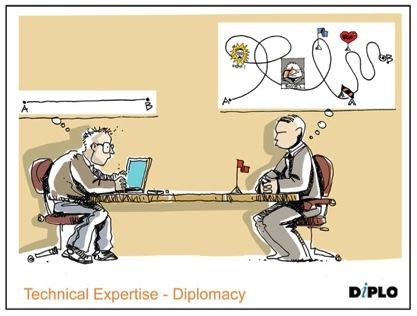
Today I was an e-squatter, a new type of conference participant. In big events, like the Internet Governance Forum, with more than 2000 participants and many parallel sessions, it’s possible to find a conference room with good wifi connection and do some work back home. My guess is that at least half of the participants in today’s meetings were physically in the room but virtually somewhere else.
I e-squatted in Room 2 at the Bali International Conference Center. The Internet connection was good and I could work on the Vanuatu launch of the CD Pacific project. Workshops were going on. Nobody asked me anything. Workshop organisers were happy that there was one additional person in the room – in these types of meeting the number of ‘heads’ in attendance is a criterion for success.
Today, in one of ‘squatting’ workshops, I kept hearing words like negotiations, persuasion, engagement, understanding, consensus, and listening…. all words I usually hear at the diplomatic training meetings I often attend. I was curious and looked at the IGF programme.
The session – where I was sitting – could not have been more technical: WS 49 IXPs: Building, Sustaining, and Governing Them. IXPs are Internet eXchange Points which should preserve traffic within a country or community. If you want to send an e-mail from Bali to Jakarta it should not be routed via Australia and Japan, which could happen on the Internet networks. An Indonesian IXP should keep traffic in the country, save money, and reduce use of the bandwidth.
It sounds like simple, common sense. But as we know, common sense is not that common. As Dan McGarry from Vanuatu said, they needed 4 years to convince all Internet players to create Vanuatu’s IXPs and 14 days to install them technically. Speaker by speaker narrated similar experiences from Latin America, Europe, Asia, and Africa. The underlying message was that it is about engaging, listening, and persuading. It is about diplomacy. After this session I will have to re-draw my drawing. The line between two dots is not straight, even when dealing with rather straightforward technical issues.




